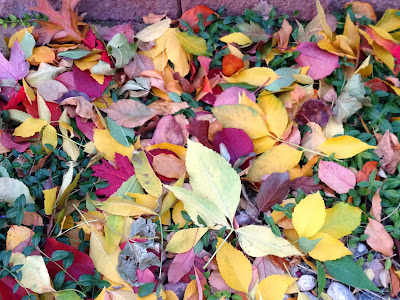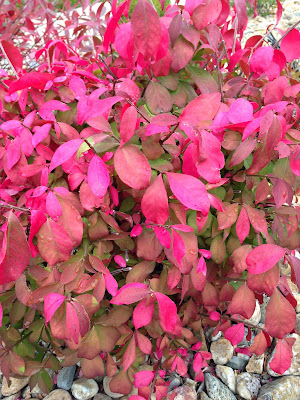Retired? Aren't you bored? What do you do
with your time?
"I lie on the couch,
watching soap operas and eating bonbons," I say when someone asks.
Given my incredible freedom to do what I want (and not do what I don't), my life could be very leisurely—even boring. But the truth is that I usually feel really, truly, insanely busy. And that's the case for lots of the retired folks I know. Most of us wonder how we ever had time to work.
Where does this busyness come from? For me, it's simple: opportunities come along that are
just too interesting to pass up. One-time adventures and long-term commitments. Some of these float unexpectedly within reach, and if I'm lucky, I get to catch them in flight. Some, I chase after. Some arrive in familiar form, some in unexpected form. The especially interesting part is that most
of the things I end up doing are a surprise to me. The retirement I expected is
not at all the retirement I have.
I've been thinking
about this recently as I've watched my life morph from one set of activities to
another. A couple of my most recent involvements were totally (totally!)
unexpected, unimagined just weeks ago. In both of these, I'm aware of a pull
that many people report as they age: the desire to be engaged with a community.
I mentioned this in passing in a previous blog, and it was these opportunities
I was hinting at.
My first new gig is
as a member of a sort of a "production collective" who will work
together to plan and produce a show about LGBTQ topics on KGNU, the local community
radio station. The show, called "Out Sources," has been ongoing for
some time. But the long-time producer moved on, and a group of us have agreed
to step in to his role. I had never, in my wildest dreams, imagined producing a
radio show—and am I ever glad it's a "collective" process! It'll be fun,
for sure. We'll get to decide on content and format for the show—neither of
which any of us has done before—and eventually produce and present the show
ourselves. The KGNU staff are extremely helpful in this process. Yesterday, I
had a private tutoring session in how to run "the board" and edit
content for the show. That'll take a lot of practice, but I'm eager to get into
it. My only worry is (totally predictably) time.
The other new gig
also promises to be rewarding in so many ways. I've written several times about
Resonance Women's Chorus of Boulder—mostly
praising their music and their social consciousness. But in addition to their
public presence, I have appreciated them as a friendship group, as a community.
I've come to know several of these women over the years, initially through my
partner's singing in Resonance. And I've had an opportunity to see how much
they show up for one another. The ways they do this are countless: attending
one another's art or music shows, contributing to causes championed by others
in the chorus, singing at ceremonies (weddings, commitment ceremonies, funerals,
memorial services), showing up over and over to help ill or dying members and their
families and friends, gathering informally to sing when singing is what they need
... the list, as I said, is endless.
When I began to
consider recently how isolated I have been from any real sense of a larger,
broader community, Resonance looked more and more appealing—but unavailable to
me, since I've never been a singer. But then Sue Coffee, the director of
Resonance (and of Sound Circle, which I've also mentioned before), invited me
to work with the chorus in a support capacity. The chance to join Resonance—in this
or any capacity—was a gift.
It is true that the
radio show will provide me with an opportunity to be connected in a new way
with the queer community in the Denver–Boulder area, and that's a very good
thing. But what speaks most to my need for a sense of belonging in a community,
what best addresses what I wish for as I age is the community of women in
Resonance.
But these two mega life
events—both of which will entail long-term community engagement never imagined by the contentedly reclusive self I was just months ago—aren't the
only things keeping boredom at bay. There are also the many one-off events that
pass through all our lives, retired or not. In recent weeks, my schedule of
such events has included a movie at the Women's Film Festival in Denver about American nuns and their activism, a play at the Boulder Fringe Festival about being closeted (and not), a film at CU's International Film Festival about Hannah Arendt, and a "Science on the Screen" talk and film event at the
Dairy Center (a benefit for flood relief).
Just to be sure I don't get bored now that those are past, my calendar
shows a similar line up in coming weeks (I'll provide links in case anyone want
to go): "Just Like Us," a play about a group of Latina friends (in Denver) dealing with the impacts of their
differing immigration status; "The Book of Mormon," which
most of you know is a musical comedy about two Mormon missionaries in Uganda (by
the Colorado-based creators of "South Park"); a much more
non-mainstream play, "G.I.M.P. Nation," a guaranteed consciousness-raising "differently-abled sketch comedy" that includes segments titled "Sex and the Pity," Suicide Hotline," and "Your Own Private Hell." Add to those the ever-changing set of musical events. Coming up soon are a concert by singer-songwriter and lefty activist Holly Near and two by a favorite local group, Somethin' about Lulu—you get the (boredom-free) picture.
There's always more
to do than can be done. Next week, I have to choose between an interesting talk
at the Boulder History Museum or a poetry/roundtable event exploring the context of
Trayvon Martin's murder. My partner reminds me that these are "existential
dilemmas" that we all face. Retired or not. And that's just counting the
fun stuff.
Really, how could I
be bored.
Meanwhile, in the
quiet recesses of my crazed mind, I've been paying increasing attention to the
issue of wildfires—our role in creating them, in making them progressively worse,
in increasing the risk to ourselves and to others, in creating an unsustainable
and indefensible (literally) situation for those who are charged to deal with
these things. I've found I don't have time to do the work I want to do on that
topic, so I'm going to take occasional days off from my editing work (OK, so I'm not
really totally retired) to do more. So
be prepared for a series of blogs ... and maybe more than that. We'll see.
After all, I'm retired. I get to choose what I do and how much of it I do.
If I wanted to, I
guess I could even get bored. Soap operas and bonbons, anyone?
Stay tuned ...







































